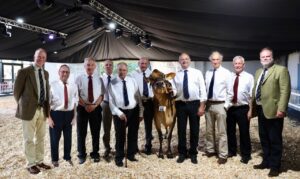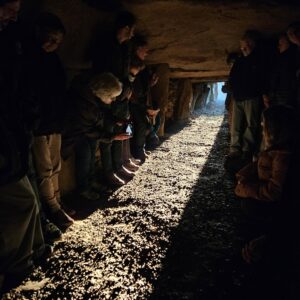
Charity draws attention to the environmental benefits of reuse. By Caroline Spencer
Buying and selling second-hand is one of the easiest ways you can reduce your personal environmental impact. This is the message that Acorn Reuse are spreading this month.
Each item was labelled with information, such as: ‘It would take 13 years to drink the amount of water needed to make one T-shirt and one pair of jeans.’
Acorn have now gone one step further by taking the message in-store to thank their customers for shopping ethically.
Acorn general manager Steve Pearce said: ‘Manufacturing and disposing of all these everyday items has a cost in terms of energy and raw materials. Buying and selling second-hand is one of the easiest ways you can reduce your personal environmental impact. You lower the demand for raw materials, reduce the demand for manufacture of goods like furniture and clothes, including the energy required to make them, prolong the actual lifetime of the items and reduce waste.
‘People sometimes think they can’t contribute to slowing down climate change, but they can. And the more people that do it, the greater the effect it will have.’
Messages on banners and boards at Acorn include:
*Buying a second-hand sofa saves the same amount of CO2 it takes to drive around Jersey five times.
*The carbon footprint of one new 100% cotton shirt is greater than driving a car from Grosnez to La Rocque and back.
*A new living room suite uses the same amount of C02 to produce as driving from Jersey to Paris = 470 miles.
‘Acorn’s primary objective will always be to support people with a disability or long-term health condition with work and training opportunities,’ Steve said. ‘However, it also has an environmental objective, which is to assist in the protection and preservation of the environment and promote the concept of reduce, reuse and recycle waste.
‘Buying second-hand household goods and clothes is a great way to reduce your personal environmental impact. Everyday items all have a carbon footprint but we set out to interpret what that means and open the conversation as the Island heads towards being carbon neutral by 2030.
‘You can look at the Reuse Network website (reuse-network.org.uk) and using their Impact Calculator see that an average settee might have a 52kg CO2 saving but it’s difficult to know what that actually means. When you put it alongside the carbon footprint equivalent of a flight or a car journey, it starts to make sense.’
‘Working with AI Studio and supported by Geomarine, we have interpreted some key messages. We want our customers to feel good about doing their bit for the environment.
‘Some of the statistics are quite shocking. Manufacturing and transporting a 100% cotton shirt, for example, has the equivalent carbon footprint as driving 35 miles. If we contribute to people’s awareness and make them think about their shopping habits in an accessible and fun way, then we will have succeeded.’
Geomarine managing director Phil Horsley said: ‘Geomarine are exploring ways to increase the amount of reused and recycled materials in local civil engineering projects. Using recycled aggregate has become standard practice. We have also completed several piling contracts using pipe recycled from the offshore oil industry.
‘Partnering with Acorn allows us the opportunity to look at different ways of thinking about our eco-credentials and how we can bring about positive effects for the environment. We have always been impressed with Acorn’s philosophy of nurturing people and improving the environment, and we are looking forward to developing the relationship.’
Jersey’s Climate Conversation was a six-week campaign aimed at encouraging Islanders to talk about the Island’s climate change responsibilities, leading to the first meeting of a Citizens’ Assembly on climate change. Forty-five randomly selected Islanders will produce a set of recommendations for consideration by the Council of Ministers and will also contribute to the Island’s long-term climate action plan.





